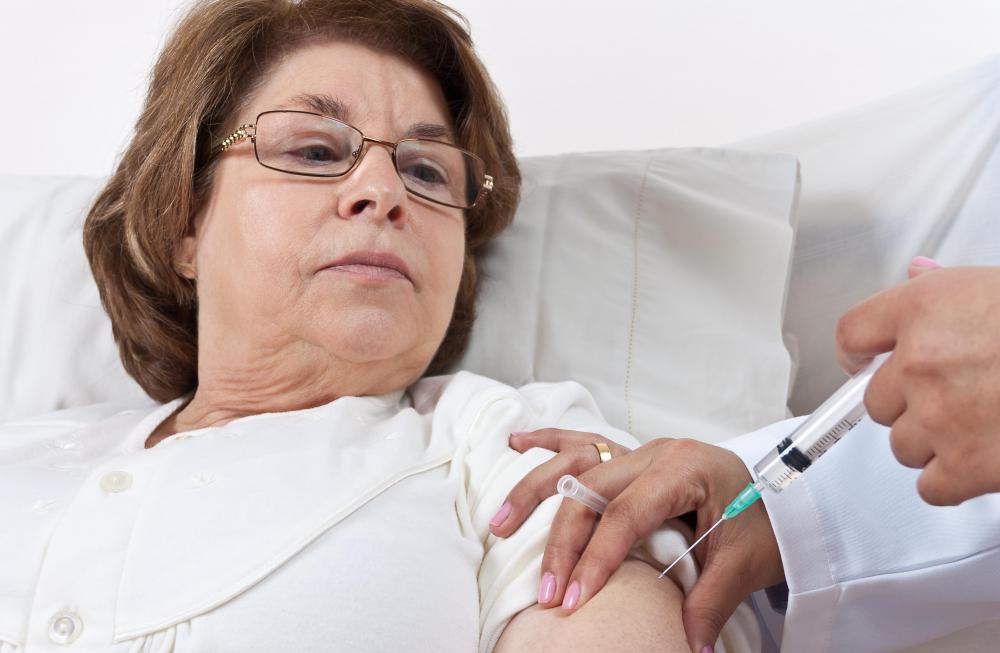At WiseGEEK, we're committed to delivering accurate, trustworthy information. Our expert-authored content is rigorously fact-checked and sourced from credible authorities. Discover how we uphold the highest standards in providing you with reliable knowledge.
What are Breast Cancer Tumor Markers?
Breast cancer tumor markers are substances, usually proteins or hormones, that are produced by the body in reaction to a tumor or by the tumor itself. They are found in the blood, urine or tissues or in the tumor tissue. Different markers indicate different stages of tumor progression and tumor growth, and they can be used to guide diagnosis and treatment and to predict prognosis.
The first stage of breast cancer detection is the mammogram, ultrasound or breast magnetic resonance imaging (MRI) exam, all of which are sensitive enough to detect breast cancer before any symptoms are noticeable. If there are any suspicious signs, then a biopsy is carried out, and only then are tests for breast cancer tumor markers given. The tests are not sufficient by themselves, because the proteins and hormones that they detect are sometimes produced in the body by other conditions.

Before breast cancer treatment begins, a tumor marker test is given in order to establish baseline levels with which to compare later results. Although not tumor marker tests as such, estrogen receptors and progesterone receptors are measured to establish the type of cancer. Then the presence of human epidural growth factor 2 is determined, because this is a protein that is present in nearly half of patients who have breast cancer.

In order to establish the type of breast cancer tumor and the best possible course of treatment, the first marker test is likely to be the urokinase plasminogen activator and plasminogen activator inhibitor test. Urikinase is an enzyme that is present in the blood plasma and urine produced normally by the kidneys but also can be be produced by tumors. This is a prognostic test, because high levels of urokinase plasminogen activator and plasminogen activator inhibitor usually mean that the cancer has become more aggressive.

Testing for breast cancer tumor markers depends on the different stages of the cancer. Some breast cancer tumor markers, such as carcinoembryonic antigen, cancer antigen 27.29 and cancer antigen 15-3, are indicative of breast cancer that has metastasized. Oncotype DX is a genetic test that helps to determine the likelihood of the breast cancer recurring. The ki-67 leveling index is another indication of how quickly the cancer cells are proliferating and thus how aggressive the cancer is. This tumor marker test measures the activity of the antigen ki-67, a nuclear protein that is present during active cellular phases but absent in resting cells.

A decrease in tumor marker levels compared to the baseline is a good indication that the cancer is responding to treatment, and an increase in levels usually means that the therapy needs to be changed. At the end of a treatment phase or during any follow-up treatments, tests for breast cancer tumor markers might be required to monitor any recurrence. Follow-up visits after four to six months are recommended.
AS FEATURED ON:
AS FEATURED ON:

















Discussion Comments
I had regular annual mammograms and had to have a biopsy for a small lump that was found. Thankfully the biopsy was benign, but they inserted a small marker where they did the biopsy. Now every year when I have a mammogram, they take an extra picture of that spot so they can determine if there have been any changes. It shows up as a small little clip on the digital mammogram pictures.
I am very thankful that I did not a breast cancer diagnosis, and also thankful for the technology we have today to help find those changes before it is too late. You never look forward to that mammogram appointment, but prevention is always so much better than finding something when it is too late.
A baseline mammogram is very important to have when you are 40 - or younger if there is a history of breast cancer in your family. This gives your doctor something to compare your subsequent mammograms to so they can see if there have been any changes. One of the most common breast cancer fact is that you have a much higher chance of getting breast cancer if you have a family history.
Mammograms do not catch everything, but they can detect subtle changes and by having other images to compare them to, gives you a real advantage up front.
Post your comments